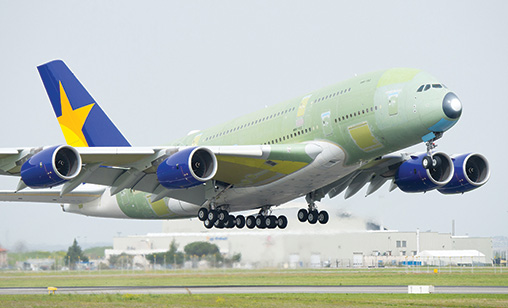News Backgrounder
Skymark and JAL to code share?
December 1st 2014
Demonstrating determination to survive despite the forced cancellation of its A380 order, Japan’s Skymark Airlines has sought regulatory approval to commence some domestic codeshare flights with Japan Airlines (JAL) in 2015. Read More »
At press time, Skymark president, Shinichi Nishikubo, said in Tokyo that his airline, the third largest in Japan, aims to commence codeshares next February with JAL on 36 return services from Tokyo Haneda airport to Shinchitose, Kobe, Fukuoka, Kagoshima and Naha.
Nishikubo emphasised to media, when the proposed codeshares were announced, that the deal was only a trade between the two airlines and should not be construed as an intention by Skymark to secure funding support from JAL.
Regulators must decide if it is appropriate to allow JAL, which received public funds for its business reconstruction, to expand its operations by code-sharing with another airline.
 |
| Skymark Airlines: nearing deal over cancelled A380 order? |
Skymark is reported to be offering 20% of its seats for the code-share, which Nishikubo estimated would improve seat utilization of Skymark ticket sales, by a forecast eight billion yen a year.
If approved, JAL will be able to offer more frequency on major routes, for example, Haneda-Shinchitose and Haneda-Fukuoka, where it is currently outnumbered by its arch rival, All Nippon Airways (ANA). Skymark also will offer JAL available cargo space on the code-share flights.
For fiscal 2014-2015, Skymark forecast it will lose a record 13.6 billion yen, so improving profitability is a priority. The airline pulled out of Narita in October and Nishikubo said the company is considering withdrawing from more routes once it analyses its average load factor at the time of its 2015 interim results.
Skymark implied it also is making progress in its financial negotiations with Airbus following the manufacturer’s cancellation of the Japanese carrier’s order for five A380s earlier this year. Nishikubo said the two sides are working towards a compromise, but no final agreement has been reached.
The two parties have been in talks since October, with a hope of reaching a final settlement by year end. When Airbus announced the deal would not go ahead in July, unconfirmed reports said that the Toulouse headquartered manufacturer was seeking a cancellation penalty of up to 70 billion yen. In October, some media in Japan said the numbers were in the range of 20 to 23 billion yen.
When Orient Aviation asked about the progress of negotiations in November, Airbus Japan president, Stephane Ginoux, declined to comment.
If the negotiations fail, Skymark maintains there is a “material uncertainty” that the carrier, established in 1998, could stay in business.
Nevertheless Skymark, battered like all Japanese operators by a falling yen and increasing competition from Japanese low-cost carriers, is forging ahead with the introduction of its 271-seat A330-300 aircraft, configured with premium economy seating with 38 inch seat pitch, on trunk routes. And Airbus is still delivering new aircraft to the lessors supplying the airline.
According to results for October 31, which were the latest figures available, the A330s were operating on nine out of 10 daily round trip flights on the key Tokyo Haneda-Fukuoka route. By October 31, Skymark was flying the larger aircraft on one round-trip flight out of eight from Tokyo to Sapporo. The delivery of a fifth A330-300 to Skymark last month boosted Skymark’s schedule to four A330 services out of eight.
On the Haneda-Fukuoka line, Skymark passengers increased by 13.6%, but capacity climbed by 32% following the introduction of the A330 on the route. Load factor declined from 80.5% to 69.3% for the month. On the Tokyo to Sapporo flights load factor dropped to 82.2%, from 86.4%, over the same month last year.
Skymark’s first half results, to September 30, reflected the delay of nine months in the introduction of the A330-300s into Skymark’s fleet. The carrier was unable to earn revenue to pay leasing fees and maintenance charges while the process of authorization dragged on.
Its first half net loss was 5.7 billion yen, compared with a previous 1.7 billion yen net profit. Until Skymark announced that it would lose 13.6 billion yen for the current fiscal year, its net profit forecast was 354 million yen to March 31, 2015.
As part of cost cuts announced after the A380 cancellation, Skymark pulled six domestic routes out of its network by October 31, including the shutdown of its Narita operations.
The carrier reported to a government finance bureau it will sell and lease back ground support equipment and two flight simulators. The asset disposal has raised 1.8 billion yen and eased pressure on cash flow.